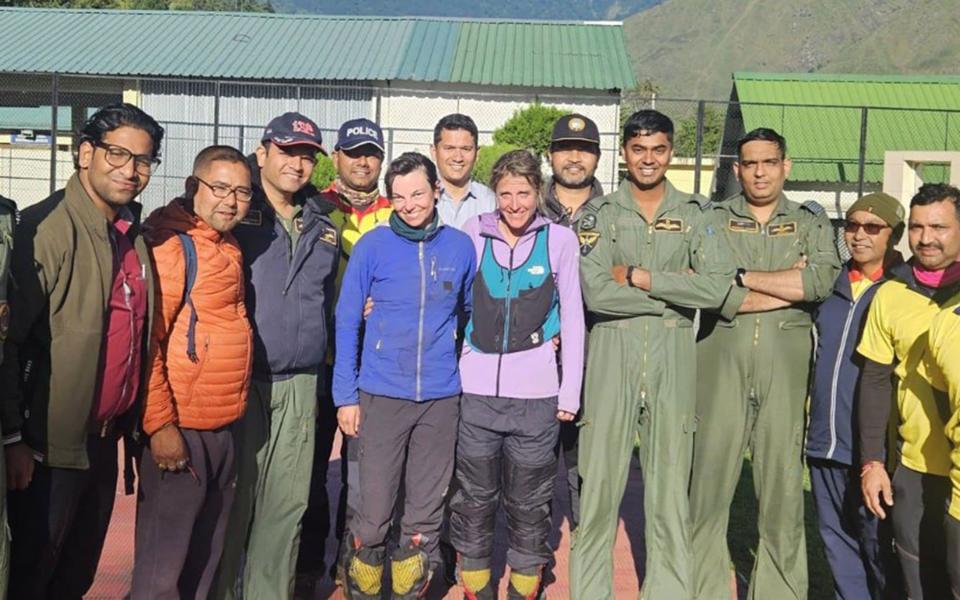The British climber who was rescued from an unclimbed Himalayan mountain told The Telegraph she feared she would die after being stranded in a -15C snowstorm.
Fay Manners, 37, and her American friend Michelle Dvorak, 31, lost almost all of their equipment, food and water in a rockfall on Thursday as they attempted to become the first people to climb the 6,995-meter-high Chaukhamba III in India.
The professional climbers survived two nights in temperatures as low as -15 degrees Celsius only in their sleeping bags and could only watch as a rescue helicopter flew past twice without spotting them.
They were found on Saturday by a team of French climbers who were in the area for their own attempt to climb the remote peak – what Ms Manners described as a “small miracle”.


She told The Telegraph: “What would have happened if those mountaineers hadn’t come to save us?
“We would have either frozen to death or tried to cross the steep glaciers without the right equipment and slipped, endangering our lives.”




Ms. Manners and Ms. Dvorak set out on their expedition to climb Chaukhamba III on September 27 from a base camp on the nearby Satopanth Glacier.
But six days later, on Thursday, they were climbing a ledge 700 meters below the summit when a sudden rockfall severed a rope they were using to drag a backpack.
“I watched the bag fall down the mountain and I immediately realized what the consequences would be,” Ms. Manners said.
The bag contained the couple’s tent and stove, as well as all of Ms Manners’ warm clothing, crampons and ice axes, meaning they were now at risk of freezing to death, starving or falling to their deaths in crevasses if they attempted to to cross the glacier to return to base camp.
“My body ran out of energy”
“We found a ledge, it started snowing and luckily we had our double sleeping bag in the other sleeping bag that we were able to crawl into for the night. I was freezing, my down pants, thicker socks and all the warmer clothes I had in my bag for the evenings were no longer accessible.”


That night they survived a -15°C blizzard after sending out a distress call.
“I felt hypothermic, constantly shaking and the lack of food meant my body was running out of energy to keep me warm,” Ms Manners remembers.
On Friday, she and Ms. Dvorak saw a rescue helicopter approaching – but it flew past without spotting them.
Fearing that no one would be able to save them in the “brutal” conditions, they decided to climb down the mountain themselves.
However, due to a lack of equipment, their progress was slow and they had to survive another night in just their sleeping bags.
“Saturday morning came and we both barely survived the night,” Ms. Manners said. “The helicopter flew by again but couldn’t see us. We were destroyed and lost faith.”
As they continued their descent – Ms Manners said she was only thinking of “solutions on how we could survive”, a team of three experienced French climbers searched for them.
The trio – Palin Clovis, Jacques Olivier Chevallier and Vivien Berlaud – had planned to climb the summit of Chaukhamba III themselves, but gave up the search for the missing women after being alerted to the danger by a friend of Ms Manners .
“As we were rappelling on Saturday, we could see a team of climbers coming down the mountain towards us,” Ms Manners said.
“When we reached them they said they were there to help us and I cried with relief because I knew we could survive.
“They helped us overcome the steep glacier, which would have been impossible without our equipment, crampons and ice axes.
“They gave us their tent and sleeping bags, gave us water and food and finally told the helicopter where to come and pick us up.”




At 7am local time (2.30am BST) on Sunday, an Indian Air Force helicopter landed on the Panpatia Bank glacier at 5,300 meters above sea level and whisked Ms Manners and Ms Dvorak to safety in Joshimath, a town 21 miles southeast.
Colonel Madan Gurung, who coordinated the rescue operation for the Indian Mountaineering Foundation (IMF), said the women were “exhausted” but otherwise in “perfectly good” health.


“Their experience as mountaineers helped them conserve food and energy, which was crucial to their survival during the 55 hours they were stranded,” he said.
From Joshimath, Ms Manners will travel to New Delhi, where she plans to “eat a lot of local food, relax my mind and sleep as much as possible” in the coming days.
But despite her death knell, the professional climber, who has opened eight new mountain routes in the last eight years, has no plans to give up mountaineering.
“I want to go home and climb in the sun in Europe,” she said. “But I will avoid the big mountains until winter comes.”

